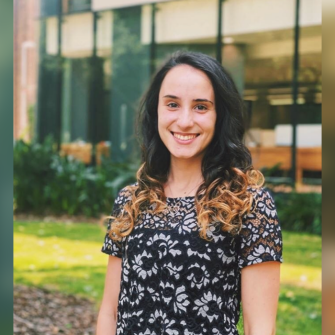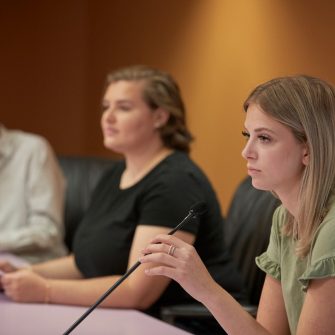Bachelor of Criminology & Criminal Justice/Psychology (Honours)
- Commencing Terms
- Term 1
- Duration
- 5 years F/T
- Delivery Mode
- Face-to-face (includes blended), Research
- Campus
-
Kensington
- Codes
- UAC code 422360
- Program code 3798
- CRICOS code 116902J
-
ATAR/2025 lowest selection rank
- 97.0 View all admission criteria
-
2026 Indicative first year full fee
- $16,000*
-
2026 Indicative full fee to complete degree
- $82,000*
-
2026 Indicative first year full fee
- $49,500*
-
2026 Indicative full fee to complete degree
- $275,000*

Join us at Info Day
Thursday, 18 December | 12–4pm | Kensington campus
Join us on campus to get personalised advice on your study options before UAC preferences close. Info Day is the perfect opportunity to get all of your last minute questions answered, the day ATARs are released.
Application closures for 2026
Undergraduate programs for 2026 intakes are closed for New Overseas Student Commencement (NOSC) applications. Applications for postgraduate programs remain open. Find out if this closure applies to you.
- Overview
- Entry requirements
- What will I study?
- Future careers
- How to apply
- Fees & Scholarships
Overview
If you want to prevent crime before it happens and build a safer, fairer world, this double degree is for you. The Bachelor of Criminology & Criminal Justice / Bachelor of Psychology (Honours) at UNSW combines two in-demand fields of study, giving you the knowledge and practical skills to understand criminal behaviour and drive progress towards stronger, more secure communities.
In the Bachelor of Criminology & Criminal Justice (BCCJ) degree, you’ll explore crime, social control and the legal system. You’ll examine issues such as victimisation, youth justice, drug-related harm and community safety, while developing the research and policy skills to turn theory into action. The program includes plenty of time outside of the classroom, including hands-on experience in prisons and courts.
The BCCJ pairs perfectly with the Bachelor of Psychology (Honours), which builds your understanding of the brain, cognitive and decision-making processes and mental health. Psychology is one of the most interesting and challenging areas of scientific inquiry with the potential to benefit both individuals and society as a whole.
Wherever your interests lie, you’ll graduate with two industry-informed degrees and have the flexibility to step into a range of meaningful roles across corrections and rehabilitation, law enforcement, mental health and counselling, policy development and research. With this distinctive blend of skills, a rewarding career awaits.
Key features
Study at two distinguished faculties
Join Australia’s top-ranked criminology program and one of the world’s leading psychology schools. UNSW is #1 in New South Wales for criminology research (Excellence in Research for Australia Report, 2018) and the UNSW Bachelor of Criminology & Criminal Justice is ranked #1 in Australia for Criminology and Criminal Justice programs (EduRank, 2024). UNSW Science is ranked #2 in Australia and =#32 globally for psychology (QS World University Rankings by Subject, 2025) and our School of Psychology staff publications receive more citations than any other psychology department in any Australian university.
Make a positive impact while you study
Benefit from hands-on experience throughout your double degree, with placements across both mental health and the criminal justice system. Visit courts and prisons, take part in Work Integrated Learning (WIL) in mental health organisations and spend a year working on a research project in the field. As a UNSW Law & Justice student, you’ll also benefit from the faculty’s dedicated in-house careers services, as well as an array of Law & Justice clubs and societies.
Get one step closer to becoming a registered psychologist
If you discover that psychology is your passion and want to take it further, you can apply for entry to professional master's programs upon completing this degree. The UNSW Bachelor of Psychology (Honours) is accredited by the Australian Psychology Accreditation Council (APAC) and satisfies the minimum requirement for provisional registration and counts as the first step in the six-year pathway to becoming a registered psychologist.
Why study at UNSW?
Join Australia’s most employable graduates
UNSW students have been recognised as the most employable students for six years in a row (Australian Financial Review Top100 Future Leaders Awards, 2020–2025). Our industry-aligned courses, hands-on approach to learning and leading academics help you graduate job-ready and confident to enter the workforce. Our graduates earn the highest median salaries among graduates from the Group of Eight universities (QILT Graduate Outcomes Survey, medium-term - three years after graduating, 2023), so you’ll be well-positioned to thrive after university.
Find strong connections with passionate, engaged students
You’ll find dozens of opportunities to cultivate lifelong friendships. Both UNSW Law & Justice and UNSW Science offer a variety of clubs and societies, competitions and festivals that bring like-minded folk together. You’ll also find plenty of support along the way thanks to peer tutoring and professional development programs. No matter your field of interest, you’ll be surrounded by people who will cheer you on and challenge you to reach your full potential.
Take your studies overseas to gain a global perspective
With global exchange opportunities at 300+ partner universities and a variety of international internships, work placements and electives available, you can enrich your education with experiences beyond Australia’s borders. Whether you study abroad for a term or participate in a work placement program, both UNSW Law & Justice and UNSW Science can be your ticket to unlocking global opportunities.
Want to see more from UNSW Law and Justice?
Entry requirements
Find out more about entry requirements for this program in the Degree Handbook.
Adjustment Factors
We offer a range of adjustment factor schemes that reward students for academic performance and extra-curricular achievements. These schemes also take into account a range of personal and educational disadvantages that may have affected your studies.
HSC Plus
This scheme rewards students who perform well in Year 12 subjects that are relevant to their preferred UNSW degree. You may be awarded up to five points.
Elite Athletes, Performers and Leaders (EAPL)
This program recognises achievements in the areas of sport, academia, leadership and music at an elite level. You may be eligible for up to five points.
Educational Access Scheme (EAS)
Factors such as illness, financial hardship, language difficulties or attending a particular school can mean you don't always get the best possible marks in Years 11 and 12. If one of these situations applies to you, submit an application for the Educational Access Scheme (EAS) via UAC. Eligible students can receive between 1 and 10 points towards their chosen UNSW degree.
Admission pathways
Your ATAR is not the only measure of your potential to succeed, which is why we offer a range of pathways into university. Explore your options below and get in touch with our Future Student Advisers to discuss your path to UNSW.
Gateway Admission Pathway
This scheme is open to students who attend Gateway schools, live in a low-socioeconomic area based on IRSAD and IEO indexes of SEIFA criteria, or are an Aboriginal and Torres Strait Islander person. It adjusts the ATAR requirements for your preferred UNSW degree and provides early offers and early conditional offers to UNSW.
Entry programs for Australian Aboriginal and Torres Strait Islander people
We offer entry programs for Indigenous Australians, including the Indigenous Preparatory Programs and the Indigenous Admission Scheme (IAS). The entry pathway program you apply for will depend on the degree you want to study.
English language requirements
You may be asked to provide evidence of your English proficiency to study at UNSW depending on your educational background and citizenship. English language skills are vitally important for coping with lectures, tutorials, assignments and examinations - this is why UNSW requires a minimum English language competency for enrolment.
If you’re completing an Australian Year 12 qualification (e.g. NSW HSC or equivalent), you do not need to provide anything extra to prove your proficiency. Your qualification will be used as evidence of your English proficiency.
If you do need to provide evidence of your English proficiency, this will be indicated in your application. You can prove this by providing evidence that you meet one or more of the following criteria:
- English language tests and university English courses
- Prior study in the medium of English
- Other qualifications
If you need to improve your English skills before you start your degree, UNSW College’s Academic English Programs are for you. The programs are suitable for various English levels and help you prepare for university studies and life in Australia.
For more details, visit the English Language Requirements page.
International direct entry
Information for applicants with CBSE, HKDSE or Singapore A Levels Qualification
Calculating your CBSE Score:
Awarded by CBSE, average percentage marks across English or Hindi, and your best four remaining subjects. Where marks are given as a range, the mid-point for that range is used e.g. 75 to 80 = 77.5.
Calculating your HKDSE Score:
Entry requirements are based on the aggregate of the best 5 achieved category A subjects (category B and C subjects are not considered).
For subjects other than Citizenship and Social Development: level 5**=7 points, level 5*=6 points, level 5=5 points, level 4=4 points, level 3=3 points, level 2=2 points, level 1=1 point, Level U=0 point.
For subject Citizenship and Social Development: Attained=2 points, Unattained=0 point. Citizenship and Social Development will only be counted towards the aggregate if the 2 points awarded for Attained ranks among the student’s best five scoring subjects.
If Mathematics Compulsory Part and Extended Part (Module 1 or 2) are both presented, both scores can be counted.
Calculating your Singapore A Levels:
Due to significant changes to the GCE A-Level Curriculum and University Admissions Score (UAS) calculation effective 2026, UNSW assessment is currently under review.
Note: Entry requirements published on this page are correct as of the day of publication and may change without notice.
We do not accept secondary qualifications from this country. We may accept tertiary study results, please contact us for more information.
Please contact us for direct entry requirements.
Admission pathways
If you do not meet the requirements for direct entry into your chosen degree, you may be eligible for a pathway program with UNSW College. UNSW College provides alternative entry options using university-approved content so that you can start your UNSW journey with confidence.
English language requirements
You may be asked to provide evidence of your English proficiency to study at UNSW depending on whether you are from an English-speaking background or non-English speaking background. English language skills are vitally important for coping with lectures, tutorials, assignments and examinations - this is why UNSW requires a minimum English language competency for enrolment.
If English is not your first language, you’ll need to provide proof of your English proficiency before you can be given an offer to study at UNSW. You can do this by providing evidence that you meet one or more of the following criteria:
- English language tests and university English courses
- Prior study in the medium of English
- Other qualifications
If you need to improve your English skills before you start your degree, UNSW College’s Academic English Programs are for you. The programs are suitable for various English levels and help you prepare for university studies and life in Australia.
For more details, visit the English Language Requirements page.
Check the specific English language requirements for this program
What will I study?
UNSW is introducing a new academic calendar from 2028.
We are moving to a new flex-semester calendar. What does this mean for your studies?
Program structure
The Bachelor of Criminology & Criminal Justice / Bachelor of Psychology (Honours) at UNSW covers a range of core subjects in criminology, sociology, crime and psychology. Over five years of full-time learning, you’ll take part in a mix of face-to-face classes and independent online learning. You’ll also have the flexibility to choose electives from both degrees so you can shape the program around your career aspirations and interests.
Full program structure
This program contains a total of 240 units of credit (UOC) across two degrees. Students must complete:
- Criminology & Criminal Justice core courses – 42 UOC
- Social Science core courses – 36 UOC
- Prescribed Criminology electives – 18 UOC
- Psychology courses (stage 1-3) – 96 UOC
- Honours in Psychology courses (stage 4) – 48 UOC
Future careers
The Bachelor of Criminology & Criminal Justice / Bachelor of Psychology (Honours) opens doors to meaningful roles across government organisations, health services, hospitals, schools, community and non-profit organisations, research institutes and private companies.
You might work to improve mental health outcomes in clinical, counselling or educational settings, help shape safer communities through correctional services and justice reform or influence public policy. Or perhaps you’ll go on to advocate for victims, support young people through juvenile justice or explore specialist areas such as health research, rehabilitation and community safety.
As you study, it might be clear which area you’d like to work in, but it’s okay if this takes time or your interests are broad. This degree has been designed with the changing needs of the sector in mind, preparing you for emerging roles across a range of specialisations. Law & Justice’s in-house careers service is also here to help you design a career that aligns with industry needs and your strengths and goals.
Since this double degree opens the door to such a range of careers, salaries can vary significantly. Your earning potential will depend on the sector you choose, the level of further study or registration you complete and the type of role you step into. What’s clear is that demand for skilled professionals at the intersection of criminology and psychology is strong. The Australian government is investing almost $100 million in funding to support growth across the legal assistance sector.
Jobs in criminology and psychology
| Sector | Example roles |
| Child and family services | Child protection officer, court liaison, family violence practitioner |
| Corrections and rehabilitation | Case manager, community corrections officer, court support officer, program facilitator, rehabilitation counsellor, youth justice officer |
| Law enforcement, intelligence & policing | Crime analyst, criminal investigator, intelligence analyst, police recruit, protective service officer |
| Mental health and counselling | AOD (Alcohol & Other Drugs) worker, counsellor, intake & assessment officer, mental health counsellor, mental health support worker, rehabilitation counsellor, substance abuse worker, support coordinator, wellbeing adviser |
| Policy, programs and analysis | Data analyst (justice/health), evaluation/research officer, policy offier, program/project officer |
| Research and academia | Lab coordinator, PhD/Master's candidate, research assistance, research officer |
| Victim support and community safety | Community safety officer, victim support worker |
How to apply
Students intending to apply to the honours program must first discuss their eligibility and study program with the Honours Convenor in the relevant school prior to submitting an application.
Ready to start your application?
Students intending to apply to the honours program must first discuss their eligibility and study program with the Honours Convenor in the relevant school prior to submitting an application.
Ready to start your application?
Fees & Scholarships
Commonwealth Supported Place multiple Student Contribution Bands may apply for this double degree. See single degrees for the applicable fee bands.* The student contribution for a Commonwealth Supported Place is an indication only of the amount payable in Year 1 based on a standard full-time load of 48 credit points (1.0 EFTSL). The actual student contribution you will be liable for depends on your individual program of study and the calendar year in which you enrol. Actual fees are calculated upon enrolment. Student contribution amounts are subject to annual review by the University and may increase each year during your studies (subject to caps determined by the Australian Government), effective at the start of each calendar year. The indicative fees listed here are based on an estimated average and are for tuition only other fees and charges are not included.
*Fees are subject to annual review by the University and may increase annually, with the new fees effective from the start of each calendar year. The indicative fees listed here are based on an estimated average and are for tuition only, other fees and charges are not included. The amount you pay will vary depending on the calendar year to enrol, the courses you select and whether your study load is more or less than 1 Equivalent Full Time Student Load (8 courses per year).
Indicative fees are a guide for comparison only based on current conditions and available data. You should not rely on indicative fees. More information on fees can be found at the UNSW fees website.
Indicative fees to complete the program have been calculated based on a percentage increase for every year of the program. Fee increases are assessed annually and may exceed the indicative figures listed here.
Indicative fees to complete the program include tuition plus an estimate of study-related costs of approximately $1,000 per year. To find out more about other costs, visit UNSW International.
Scholarships
At UNSW, we award over $83 million in scholarships each year. We pride ourselves on rewarding excellence and making university accessible to students from all walks of life. Whether you’re a domestic or international student, our range of scholarships, prizes and awards can support your journey.
Progress starts here – at a world-leading university

Top 20 Worldwide
Ranked in the global top 20 for three consecutive years
QS World University Rankings, 2024–2026

Winner of the AFR Most Employable University Award six years in a row
AFR Top100 Future Leaders Awards, 2020–2025

Australia's #1 for Innovation
Highest number of startups and spinouts from university-developed tech
SCOPR report, 2024





